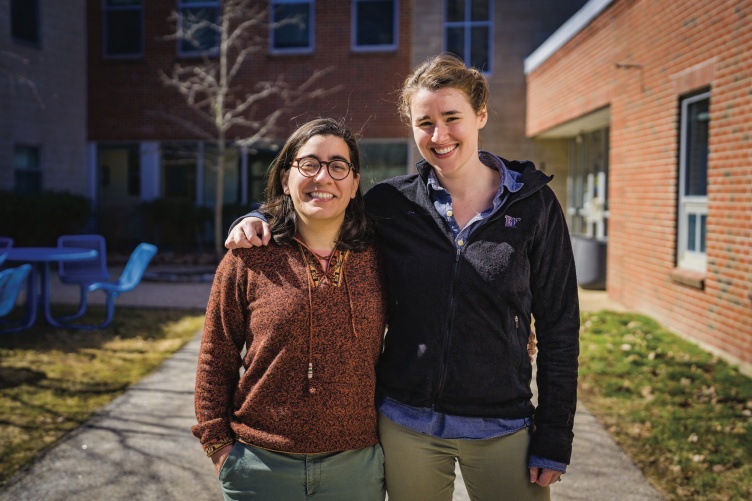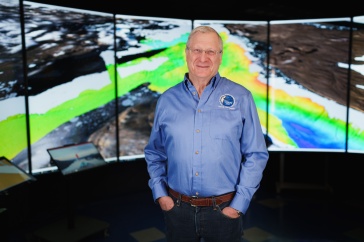
Ph.D. candidates Alexandra Padilla, left, and Liz Weidner are among many UNH graduate students, faculty and research staff who led efforts to end racism in geosciences.

Sophia Burke ’20G, Alexandra Padilla ’22G and Elizabeth Weidner ’22G are all actively carving out their own niches in the geosciences.
Burke is a postdoctoral research associate in UNH’s Earth Systems Research Center, focusing her work on understanding the effects of climate change on Arctic peatland areas using remote sensing.
Padilla’s interest in underwater acoustics has led her to pursue a Ph.D. in ocean engineering at UNH, with research centered around acoustics and bubbles. And Weidner is also a Ph.D. candidate — in a joint program between UNH and Stockholm University — whose research focuses on studying ocean water column structure using acoustics.
“I want to create a space that is inclusive, and I also want to create a space where I can support my students or collaborate in the way they need to feel supported.”
Establishing their respective places in a field historically short on diversity is one thing. But all three women are also leaders in a movement designed to shape a future where anyone — regardless of race, gender identity or sexual orientation — can do the same.
“The geosciences are an area that is not very diverse, and that’s because these spaces were not built for people who don’t identify as white, cisgender, hetero, etc.,” Burke says. “If a space is not built for you, it’s no wonder you have a much harder time succeeding there.”
Indeed, the geosciences are among the least diverse STEM (science, technology, engineering, math) fields, according to a commentary published in the journal Nature Geosciences in 2020; nearly 90% of doctoral degrees in geosciences go to white people.
It’s an issue that many in the field are working to untangle. That list includes UNH faculty, staff, researchers and graduate and undergraduate students who have participated in Unlearning Racism in Geosciences (URGE), a nationwide National Science Foundation-funded effort and curriculum that aims to understand and address the issue of racism in geoscience.
“Personally, picturing a future in my own lab, I want to create a space that is inclusive, and I also want to create a space where I can support my students or collaborate in the way they need to feel supported.”
Several URGE pods were convened at UNH, including those for Earth sciences, natural resources and the environment, ocean mapping and engineering, the Earth Systems Research Center and Ocean Process Analysis Lab and the Leitzel Center, engaging hundreds in issues around justice, equity, diversity and inclusion.
Burke helped lead a fieldwork safety session at the American Geophysical Union meeting in December, and Padilla and Weidner co-led one of the UNH URGE pods.
“I’m hopeful it can be a place where there’s no longer a mold depicting what a geoscientist looks like, so that folks who don’t feel like they fit into the mold are no longer trying to fight that,” Burke says. “That it’s a place where anyone can feel not only that they are included but they are supported and can thrive.”
Much of the URGE work is centered on deconstructing systemic norms that have existed for decades, finding ways to make hiring practices, fieldwork safety documents and many other elements of work in the geosciences more inclusive and diverse.
“One of the things we’re really focused on is trying to take down those barriers in the geosciences, the idea of structural racism that is sort of baked into the system,” Weidner says.
That starts by simply having conversations that encourage consideration of diverse perspectives, but it also requires useable roadmaps for progress. Among the tools under development following the UNH pods are a more inclusive fieldwork safety manual — led by Burke — as well as a resource map sparked by the pod Padilla and Weidner led that collects and presents a variety of resources for BIPOC (Black, Indigenous and people of color) community members.
There is plenty more work ahead — including ensuring that stakeholders at the university level take ownership of the resources and update and disseminate them consistently and appropriately — but the work already undertaken has been inspiring to the UNH geoscientists involved.
“My hope is for me to see a place where I can see myself, or any student who comes in, who happens to be Puerto Rican or African American or however they identify — that they can walk into a place and feel that there is a safe, inclusive space for them,” Padilla says.
Adds Weidner: “Personally, picturing a future in my own lab, I want to create a space that is inclusive, and I also want to create a space where I can support my students or collaborate in the way they need to feel supported.”
-
Written By:
Keith Testa | UNH Marketing | keith.testa@unh.edu
















































